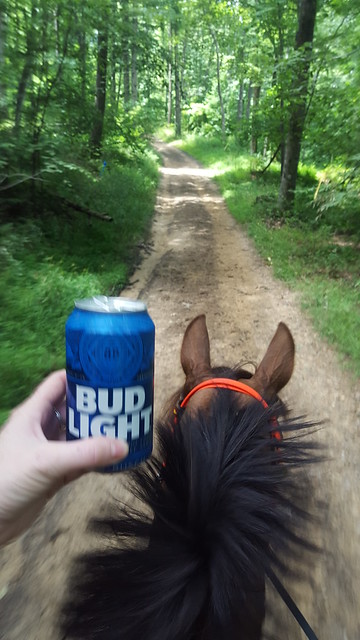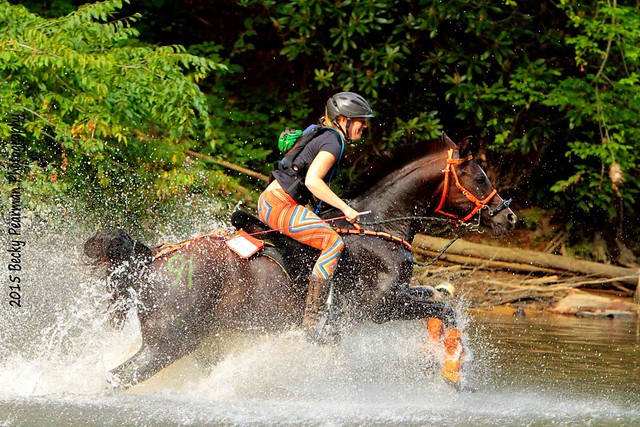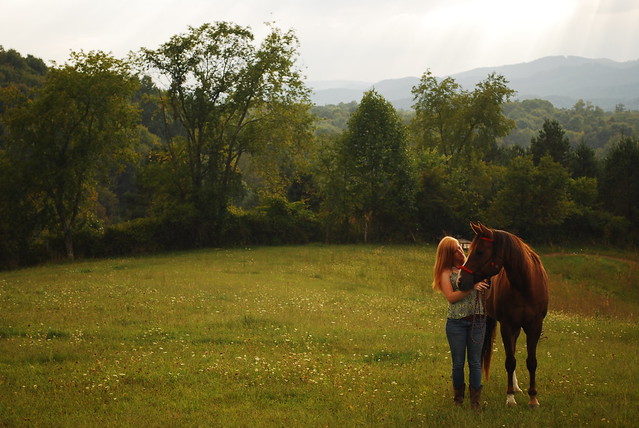I love owning horses. I love all of the responsibilities that come with it (good and bad, big and small - especially the small!) But there were a lot of things that while I grasped on some level, I didn't fully know or embrace for a long time. Sometimes you just have to experience something to gain further understanding.
I have three horses and I compete in multiple disciplines, endurance and eventing. As I first read Olivia's post, I could thing of several examples specific to each sport, but the more I thought about these, the more I realized I could group a lot of them into large categories.
Below are six things I didn't know that I didn't know before I owned and trained my own horses. And, as with Olivia's post, the below is addressed to the 2012 version of myself who had minimal understanding of what it was to train a horse from the ground up, had only competed in one limited distance ride, had minimal experience working through training holes, and had very limited equestrian experiences outside of my small rural community.
: : : : :
Go slow to go fast. (Always. Always. Always.) I'm a goal-driven person who likes to check things off a list and move forward to the next one, but as we all know, horses don't care one iota about our "plans" and "goals" and "timelines". While a large number of sources preached going slow to go fast when it came to horse training, it took me countless times of "failing" and having to take two, three, or eight, steps backwards before I could proceed to the next stage to realize that there really was something to this "going slow to go fast" nonsense. In hindsight, the large majority of "problems" I've encountered with my horses have been from pushing too much too soon. I've had to go back to the proverbial drawing board countless times over the years as I proceed with new tasks with the horses.
As I think back on some of those experiences, I realize that if I'd simply been in less of a rush and had done things more incrementally at the time, I wouldn't have had the issues I had. I've been taking things much slower of late, especially with Q, and have been reaping HUGE rewards from doing so. It was hard to create a habit of checking my own goals/ambitions in favor of going slowly, but it's helped me remain in a much better place with the horses since I did (not to mention, a better place for myself mentally!) I anticipate a less stressful future now that I've firmly embraced this concept.
 |
| With enough time and miles, you can also have a horse who takes a nap while standing sandwiched between firetrucks with flashing lights and sirens and a line of traffic (this was for a parade) |
Time and miles. Experiences will make a better horse and you've got to have patience to take the time to give the horse those experiences. Example 1: Q used to be a holy terror about loading on a trailer, but the more times we traveled, the better she became. She's now my most reliable trailer horse and will self-load, sometimes from a distance of 20 feet! Example 2: Griffin used to arrive to a new location and scream and scream and scream. Then I took him off property, alone, to dressage clinics, XC schooling, and some HTs last year - a lot of travel in a short time. By the final one, he screamed maybe 2x the whole time we were at the venue. Example 3: When we used to arrive to endurance ride camps, Q would have a hard time settling in to eat, choosing instead to remain on high alert. Years later, the mare digs into her food right away and even spends part of the evening lying down. Put in the time, travel the miles (on the horse and on the road), and you'll get there.
 |
| Countless miles and hours on this horse since 2005 have created a reliable mount I can trot through the woods on in a carefree manner with my phone in one hand and a beer in the ot |
You've got to put in the work. Over the years, countless people have told me they want horses "just like" mine. Several people have gotten into horses as a result of interactions with mine; most of those people got right back out of horses in short order when things didn't go as planned. My horses are as wonderful as they are because I have spent (and continue to spent) inordinate amounts of time working with them. When Griffin became mine at 1½ years old, I spent every day of the week with him for a long time. That time didn't have to be mentally or physically strenuous - a lot of it involved grooming, hoof trimming, or simple long hikes with him on the leadline because you can only do so much groundwork in a week. The time spent and the solid boundaries and expectations I set throughout turned him into a horse I can jump on to do just about anything with! Additionally, when issues crop up with my horses, I do my homework to get them through it. Dan preaches high and low about how much better Q is for shoeing because I did my homework. Prior to putting in the work I did, it took him 3 hours to get two hind shoes on. Now, he can hot shoe all four hooves in less than half that time. You get from your horse what you put into them. If you put in the work, you'll have a really outstanding and reliable animal, if you don't? Well, I'm sure you can connect those dots for yourself.
A foundation in dressage will help every other riding discipline. I resisted learning anything dressage-y for years. YEARS. It was intimidating! But when I finally caved and started learning about it, I realized how amazing it was and how much it would benefit every other aspect of my horses' lives. Teaching my horses how to move and utilize their bodies properly, with balance helps them be better, stronger versions of themselves. It helps build strength to support their conformational weaknesses thus lowering the likelihood of injury. Additionally, building the proper muscling throughout their bodies makes it easier for them to: move down the trail for miles upon miles (endurance), maneuver through a tricky stadium course with greater finesse and balance (jumping), and tackle a cross country course with greater rateability due to the ability to adjust strides and gaits at a moment's notice with better balance (eventing). Certainly a lot of other training aspects are included in meeting the goals for other disciplines, but a foundation in dressage can greatly improve all of them.
Don't underestimate the power of rest. Now, this is greatly simplified, but, for every tough workout your horse performs, microtears develop. These quickly heal to build more strength with time. However, if you continue to put in strenuous workout after strenuous workout without rest, the microtears don't have time to heal and may develop into bigger issues that could sideline your horse for days, weeks, or months! Or, the other side of the coin to working your animal too much (endurance is where I've witnessed this most often), you may cause them to start to burn muscle for fuel and their bodies will become too scrawny and weak to keep up with the stress of the task at hand. Rest is incredibly important to help build a stronger athlete.
Q's performance in endurance increased exponentially when I rode her less. Instead of putting in 6-7 mile rides 4-5 days a week with one hill work gallop session, I began putting in several short 20-40 minute sessions on the flat (hi, dressage!) each week, a hill work session with gallop sets once a week, and a long trail ride (12+ miles) every other weekend. Q's body looked better and her work ethic improved greatly. She attempted - and completed - her first 100-mile ride following this protocol, putting in less than 20 rides in the 6 months prior (though she did have a great baseline of fitness prior to this that is important to note). People are always under the perception that you have to ride so much more to be 100-mile fit! The reality is quite different. Rest is a critical part of every training schedule I have for my horses, and I really think it has helped them perform better.
If you really want to try something, try it! Now, I say this with caution because you certainly shouldn't jump all willy-nilly into something that could hurt you or your horse, but seriously, if you really want to try a new discipline or skill, DO IT. Don't wait on anyone. Get out there and try it. That may mean you first have to research and learn about it, then implement it in very small increments that build over an insanely long period of time in comparison to others, but that's okay! You're DOING THE THING.
For YEARS I wanted to jump - and secretly, I wanted to gain enough skill to gallop and jump a XC course. But I was afraid to jump without help/guidance because I knew what kinds of accidents and injuries could occur to horse and rider. I read a lot about it, but still held off. But as time passed and I grew up, I realized that if I didn't take some initiative to do this thing I really wanted to do, I would never experience it. And so I started dabbling little by little, year by year. And now? I'm living my dream and it's pretty fucking fantastic. It hasn't come easy, and it's taken much longer to get to this place than it may have if I had a bigger budget and lived a lot closer to trainers, but the journey has been a blast every step of the way and I'm so glad I pushed myself into the deep end and gave it a whirl!
: : : : :
So, what about you? What's something you didn't know that you didn't know days, weeks, months, years ago that you know now?





Love all of this ❤️ especially the final one, where you're living your dream with eventing! I have so much respect for the way you've tackled this new discipline with limited access to instruction. It's inspirational!
ReplyDeleteThanks! I guess I just had the itch ☺
DeleteLess is more is something I thankfully learned early on with endurance. So many people over ride/over train and I think that goes into all disciplines. Rest more, work smarter.
ReplyDeleteAmen. Rest, rest, rest!
DeleteOh I love this post! I may have to get on this blog hop! I love how thoughtful your answers were:)
ReplyDeleteWould LOVE to read yours!!
DeleteAgreed! Especially about dressage. It's more than just having a round horse and going through the movements. It's amazing how important it is to ALL of what we do with our horses!
ReplyDeleteIt seriously helps horses be so much more versatile, I think! And minimize the likelihood of injury because they're working more correctly and thus efficiently.
DeleteSo much of this resonates with me - in such a good way. Especially "Time and miles. Put in the time, travel the miles (on the horse and on the road), and you'll get there." After a somewhat tough week with Annie, it makes me look forward to the future and the progression
ReplyDeleteYou two will absolutely get there! She's made such marked improvements already thanks to the time and experiences you've given her. =) The journey can be frustrating, but it sure is fun.
DeleteSuch fantastic points. Love that this is going around.
ReplyDeleteMe, too, it's nice to step back and reframe thinking in this manner.
DeleteAgree with this entire post, but the last point really resonates with me. I didn't take jump lessons until 3 or 4 years ago, and I'm so glad I started lessons and tried eventing after years of wanting to!
ReplyDelete